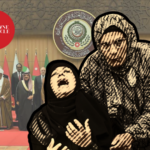Arab Spring Exposes Duplicity of Conventional Western Policy

(Image Credit: Dana A. Shams/Gulf News)
By Ramzy Baroud, Special to Gulf News
For many Arabs, Britain’s Deputy Prime Minister, Nick Clegg is just another politician committed to preserving his interests and those of the ruling class in his country. Despite his attempts at appearing kinder than other mainstream British leaders, it isn’t hard to see through Clegg’s repeated enthusiastic references to the Arab Spring.
In a widely quoted speech delivered at a British Council seminar (August 22), Clegg made what sounded like a positive assertion: "Today I want to make it absolutely clear: the UK will not turn its back on the millions of citizens of Arab states looking to open up their societies, looking for a better life."
How did Clegg get the impression that ‘millions of citizens of Arab states’ were fearful about Britain turning its back on them? In fact, a closer look at British past and present support of Arab dictators indicates the very opposite.
Arabs wish to see their reality divorced from British meddling and intervention. The media is awash with reports confirming the UK’s own detrimental role in aiding the very dictators, who — now fallen — are readily condemned by Clegg and Prime Minister David Cameron.
"The unrest in Libya, Tunisia, Egypt and across the region has brought attention to one of the UK’s most successful export markets: military equipment," claimed a report in the Guardian Online’s ‘Datablog’. Not only did the UK supply Israel with weapons that have been used against Palestinian civilians, it also supplied military technology to Libya’s Muammar Gaddafi and Egypt’s Hosni Mubarak.
But despite the damning evidence, top British politicians continue to brag. "We have saved the lives of many Libyans," Cameron said in the House of Commons on March 24, according to the Telegraph. "In taking this action, we should be proud that we’re not only acting in British interests but also being true to our values as a nation."
Clegg too has an estimation of the number of Libyan lives his government supposedly saved. He "believes that without Nato intervention in Libya, tens, if not hundreds, of thousands of Libyans would have died at the hands of Gaddafi’s forces and inaction would have threatened the Arab Spring as a whole," reported the Telegraph on August 21.
The distance between British rhetoric and action is vast and disturbing. Is it possible that the Arab Spring served as a moral wake up call to British politicians, that they too needed a change of course by rallying behind the revolting Arab masses? Not exactly. The language seems merely tactical, as the politicians’ behaviour continues to follow the old paradigm.
"We went to Libya with a clear humanitarian mandate," Clegg told the British Council in his recent speech. Never mind that Nato has exceeded the limits of that mandate, interpreting it to mean anything useful to its own strategic interests. Such a moralistic pandering invites a plethora of urgent questions. Why did Britain do business with Gaddafi despite his bleak human rights record? Why does it continue to back up other dictators in the Arab world and elsewhere?
British politics is, of course, not unique in its double-speak and moral inconsistency. Indeed, it is a reflection of a greater phenomenon of co-opting and meddling in the outcome of Arab revolutions.
Recent examples include comments made by US Defence Secretary Leon E. Panetta, who claimed in a PBS television interview that "the changes that are taking place (in the Middle East), people coming together to … seek the same kind of rights and opportunities and freedoms that others enjoy in this world … is a good sign for the future." Of course, this assessment excludes Palestinians, Iraqis, Afghans, and any other people whose freedom might jeopardise US interests.
The attempt at co-option has its own monetary side as well. Foreign ministers from the Group of Eight industrialised and developing nations (G8) estimate that $20 billion is needed to "help Arab Spring countries make the transition to democracy", according to Dow Jones Newswires (September 8).
This money-oriented assessment of popular revolutions was echoed by Clegg himself last month: "Youth, technology, a lack of opportunity and inclusion — factors which have collided to create citizens who want more, who know more, who aspire to more …"
These statements completely ignore the very dubious and, in my opinion, fundamental role played by western governments (like Cameron’s and Clegg’s), US wars (like ones lead by Panetta) and the very financial institutions (like the G8) that forced frustrated and alienated Arab youth to know less and have less, and which have suppressed their aspirations for freedom and democracy.
Is it possible, Clegg, that the Arab Spring was not merely targeting dictators but also western governments that aided, financed, armed and justified them? Will your government have the moral courage to accept responsibility and to chart a different course — one where rhetoric and action finally meet?
– Ramzy Baroud is an internationally-syndicated columnist and the editor of PalestineChronicle.com. His latest book is My Father Was a Freedom Fighter: Gaza’s Untold Story.










































0 Comments